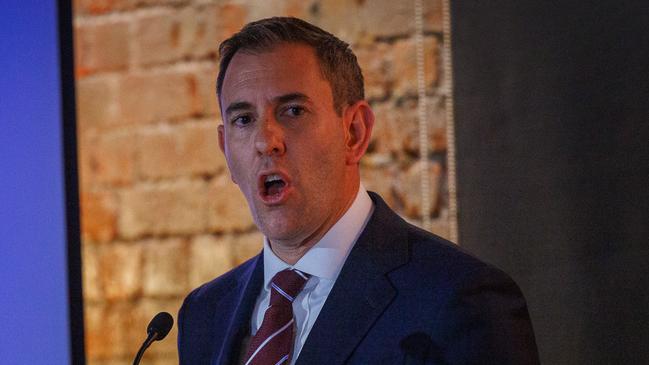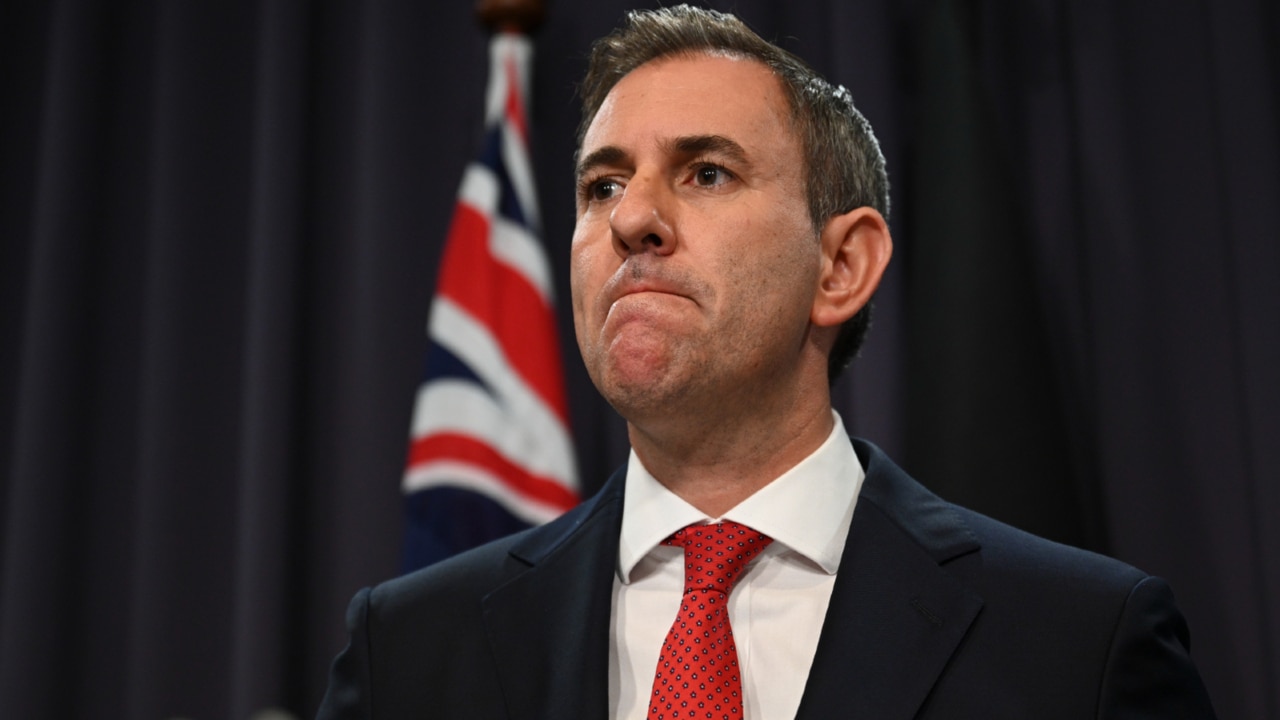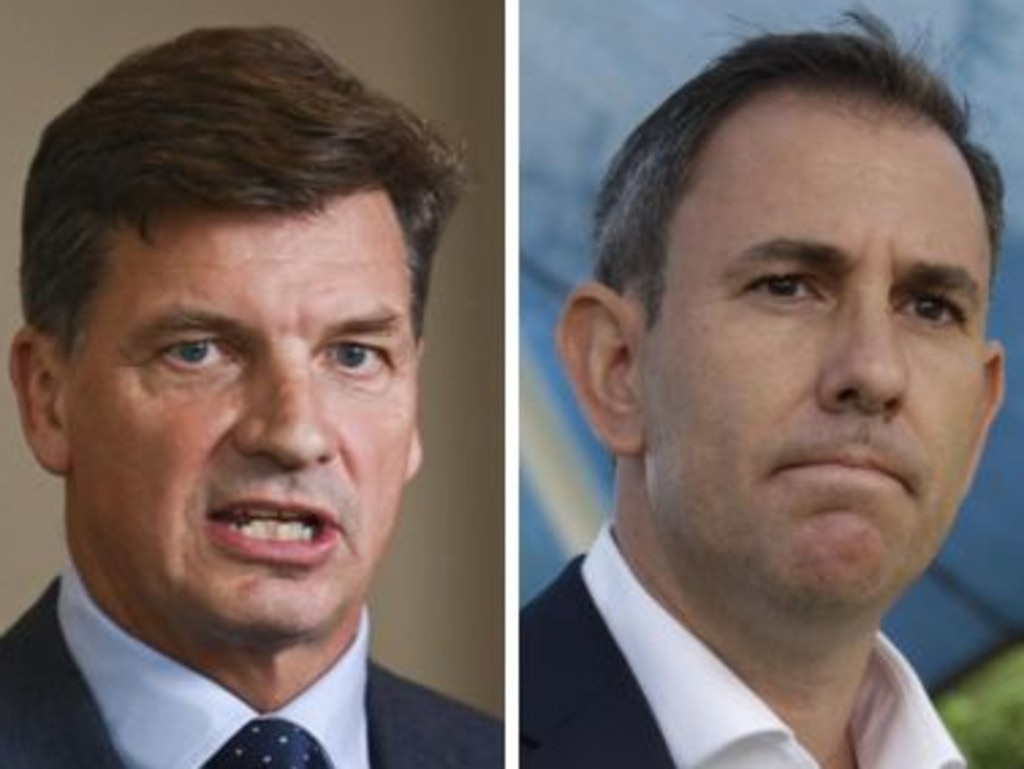Treasurer Jim Chalmers attacks Opposition Leader: ‘Peter Dutton is dangerous’
Jim Chalmers has attacked Peter Dutton as the ‘most divisive leader of a major political party in modern history’, in a major speech in which he outlined his blueprint for a ‘fourth economy’.

Jim Chalmers has attacked Peter Dutton as the “most divisive leader of a major party in Australia’s modern history” who is deliberately undermining cohesion and preying on social fractures for political advantage, positioning himself ahead of the election as a Treasurer who can take on the alternative prime minister.
Dr Chalmers, considered a future Labor leader and potential successor to Anthony Albanese, used a major pre-election speech on Monday night to warn economic dislocation is triggering waves of global violence fanned by fragmentation and destructive leadership.
The 46-year-old also said Labor’s stage-three tax cuts overhaul was his “proudest” moment and outlined his blueprint for a “fourth economy” led by artificial intelligence, a bigger care economy, 90 per cent of electricity globally generated by renewables by 2050 and a bigger, more influential Indo-Pacific region.
Invoking patriotism and national security in reflections on former Labor prime ministers John Curtin and Ben Chifley, Dr Chalmers conceded “there’s a lot at stake” and “we don’t take any outcome for granted”.
With polling indicating plunging support for the Prime Minister and Labor tracking towards minority government, Dr Chalmers defended his economic management during a cost-of-living crisis and high inflationary environment. He said the Coalition was wrong to criticise government spending in the budget and flagged that Labor was not preparing a “spendathon” to woo votes ahead of a tight election.
In a politically charged speech at the Labor-aligned John Curtin Research Centre in Melbourne, Dr Chalmers launched an extraordinary assault on the Opposition Leader’s readiness to lead the country while acknowledging the government faced a tough re-election fight.
The attack followed a heated two weeks in parliament headlined by Mr Dutton heaping pressure on Anthony Albanese over claims the government did not impose adequate security checks in fast-tracking thousands of tourist visas for Palestinians.
“Leadership which is destructive, and divisive, is not really leadership at all. And that’s what we are seeing from Peter Dutton. He is the most divisive leader of a major political party in Australia’s modern history – and not by accident, by choice,” Dr Chalmers said.
“At a time when most sane people see political divisiveness around the world and want to reject it, he wants to embrace it. It is the only plank in his political platform. He divides deliberately, almost pathologically.
“This is worse than disappointing, it is dangerous. His divisiveness should be disqualifying.”

In his Curtin Oration, Dr Chalmers strayed out of his economic portfolio to accuse Mr Dutton of playing one note on “his dog whistle”. “He wants to start a culture war because he has no idea how to finish the fight against inflation. He picks fights and stokes division on national security because he’s got no idea about economics. He couldn’t care less about the pressures people are under,” he said.
“If anything, Dutton wants higher inflation, higher interest rates, higher unemployment, lower wages and less help. We are now well into the third year of a three-year parliamentary term and he’s still ticked precisely none of the necessary boxes.”
The Rankin MP, who mentioned Mr Albanese’s flagship Future Made in Australia policy once in the speech, warned that manufacturing had crashed from 15 per cent of output in the 1980s to 5 per cent in the 2020s.
Referencing a quote by former Labor prime minister Paul Keating about “Australia’s first three economies”, Dr Chalmers mapped out his vision for a fourth economy driven by energy, technology, demography, industry and geography. Dr Chalmers, who wrote his doctoral thesis on Mr Keating, titled Brawler Statesman, and mentioned his political hero four times in the speech, said “in 2024 we are the same distance from Hawke and Keating as they were from Curtin and Chifley”.
“Every four decades there’s a defining one and it determines the three that follow. The 1940s; 1980s; 2020s. Now we are creating a new fourth economy for Australia. Not by rejecting the first three, but by building on them,” he said.
“The contours of this fourth economy are obvious. By 2030, AI could contribute up to $4.4 trillion to the global economy – more than the current output of the United Kingdom. By 2050, with people living much longer and healthier lives, our care economy could grow by over 50 per cent as a proportion of GDP.
“In the same year, 90 per cent of electricity globally could be generated by renewables – the biggest transformation we’ve undertaken since the industrial revolution. And our region is expected to account for over half of the world’s total output.”
After winning support from Mr Albanese in January to break an election promise and overhaul Scott Morrison’s legislated stage-three tax cuts, Dr Chalmers said “the judgment I’m proudest of as Treasurer was the change we made to the tax cuts so that every taxpayer now gets one”.
“A lineball political call but an economic no-brainer,” he said.
In a direct pitch to voters, Dr Chalmers said Australia must not “return to the drift, decay and divisiveness of the last wasted decade”. “There’s a lot at stake. Our social cohesion, our fourth economy. We don’t take any outcome for granted. Never have, never will.
“Like Curtin and like Chifley, we are focused on the main game. We are governing from the middle and the mainstream. We are leading with compassion, foresight and vision. Looking to heal divisions not make them worse. Expanding opportunity not limiting it. Learning from the patterns of history and progress, and building a new generation of opportunity in a new fourth economy for Australia and its people.”
Dr Chalmers said Labor was focused on leading the biggest economic transformation “since the industrial revolution”, with the Indo-Pacific region accounting for over half of the world’s total output. “Our task is to harness these forces of energy, technology, demography, industry and geography to our advantage. Our central opportunity lies in the revolutionary transition now under way in global climate, energy and capital markets,” he said. “This will transform our industrial base and put living standards on a higher trajectory – with a big emphasis on human capital, investment flows, technology and the care economy.”






To join the conversation, please log in. Don't have an account? Register
Join the conversation, you are commenting as Logout